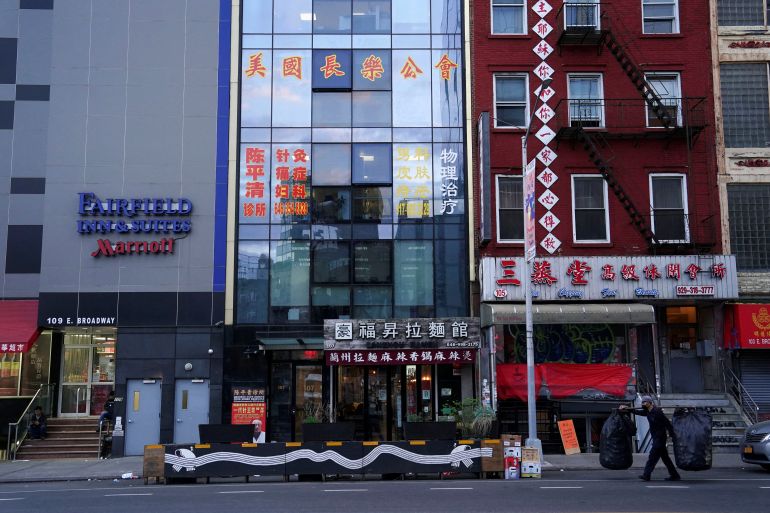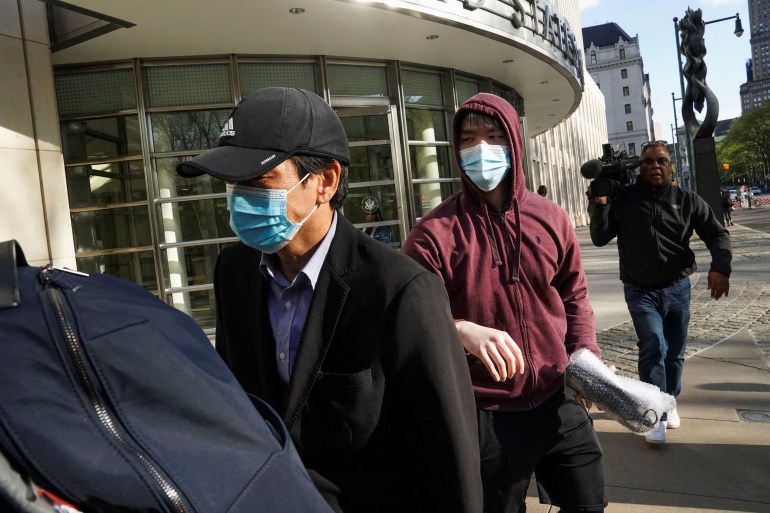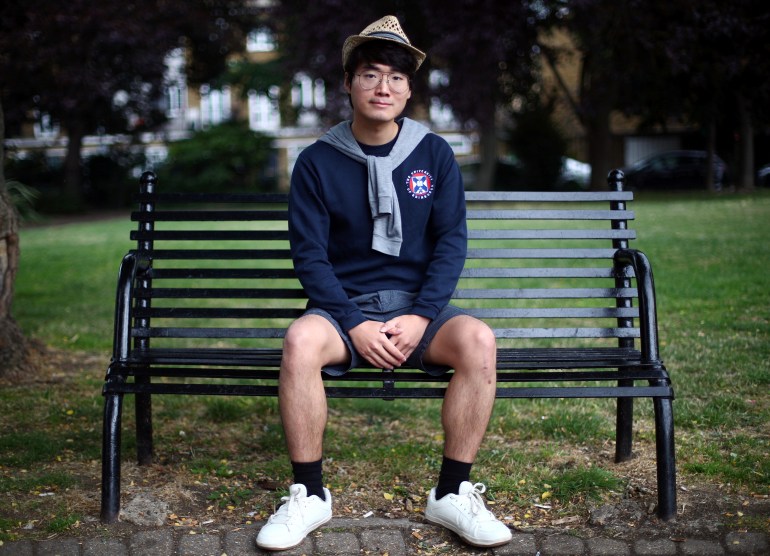Dissidents urge Western action as China targets critics overseas
Alleged Chinese police stations overseas raise concerns Beijing is formalising surveillance far beyond its borders.

A hotel in Stockholm, an estate agent’s office in London and a space above a noodle shop in New York City’s Manhattan might seem like innocuous places, but they are among several locations around the world that have played host to alleged Chinese police stations.
With most of the identified facilities in Europe and North America, Chinese citizens who have fled repression at home fear they could now be ensnared by the increasingly long arm of Beijing’s law enforcement.
Keep reading
list of 4 itemsUkraine slams China envoy’s ‘absurd’ remarks on ex-Soviet nations
China lodges complaint over S Korean president’s Taiwan comments
US arrests two for running secret Chinese ‘police station’ in NYC
“People are afraid that it is becoming impossible to escape Chinese repression even in places like London,” said Simon Cheng, who was once detained in southern China and is the founder of London-based Hongkongers in Britain.
The existence of the police stations was revealed at the end of last year when Spain-based nongovernmental organisation Safeguard Defenders revealed in two reports based on open-source research that at least 100 police stations had been established outside China by several different Chinese police jurisdictions since 2018.
Aside from a location in Dublin that had a plaque in front reading “Fuzhou Police Service Overseas Station”, most of the stations have operated clandestinely and outside public knowledge.
Among the diaspora communities — from Chinese and Hong Kong dissidents to Tibetans and Uighurs — the stations stand as a warning that without concrete action by the democratic countries in which many of the alleged facilities are operating, there will be few places left in the world where they can be safe from the Chinese state.
After months of inaction, the United States announced its first arrests in connection with the Chinese police stations last week.
At a press conference on April 17, the Justice Department said it had arrested Liu Jianwang, 61, and Chen Jinping, 59, on charges of operating a police station on behalf of China, accusing them of engaging in transnational repression against members of the Chinese diaspora community in the US.
The department added that the two reportedly admitted to having deleted correspondence with a Chinese official once they realised they were under investigation. It did not confirm the location of the alleged police station, but the case is suspected to be linked to the Manhattan site, which closed towards the end of last year.

US Attorney for the Eastern District of New York Breon Peace sought to reassure those diaspora communities that have traditionally been targets of Chinese repression.
“My office and our law enforcement partners are here to protect you and your rights, and no foreign country will stop us from doing that,” he said at the press conference.
Slow response
Other Western countries have yet to make progress on the issue, including the United Kingdom where Cheng was given political asylum in 2020.
Cheng said he was not surprised by the Safeguard Defenders revelations, noting close relationships between several Chinese community leaders in London and Chinese officials not only in the UK but also back in China.
He believes the presence of Chinese police stations is an indication that Chinese law enforcement is becoming more formalised abroad, and that has stirred concern among Hong Kong people in the UK, many of whom left the Chinese city following the imposition of the National Security Law (NSL) nearly three years ago.
“We are particularly concerned that the police stations will be used to implement the National Security Law abroad,” Cheng told Al Jazeera.
The broadly-worded NSL essentially outlawed political action not approved by the Chinese government, but it also threatened extraterritorial application under Article 38 (PDF), which technically gives Chinese authorities the power to prosecute those accused of violating its provisions anywhere in the world.
In Stockholm, meanwhile, the founder of the Swedish Uyghur Committee, Shukur Samsak, is also concerned.
He sees the Chinese police station as a sign of increasing Chinese surveillance of the Uighur community in Sweden.
“When you attend a Uighur demonstration or rally today, there will more and more often be suspicious-looking people on the sidelines that take pictures of you and film you,” he told Al Jazeera.

The establishment of alleged Chinese overseas police stations mirrors the increased repression in China itself, which has become endemic since President Xi Jinping came to power in 2012.
Now in an unprecedented third term and set to rule for life, Xi has presided over a crackdown on dissenting voices from civil society to activists and journalists, and expanded China’s system of detention and incarceration.
A much-trumpeted crackdown on corruption has also netted prominent entrepreneurs and officials, including China’s first-ever president of Interpol who was based in France and disappeared on a trip to China in September 2018.
Eighteen months later, Meng Hongwei was found guilty of corruption by a Chinese court and sentenced to 13 and a half years in prison.
‘They are illegal’
Operating police stations overseas is a major development in Chinese law enforcement, not least because such facilities outside a diplomatic compound are in violation of international law.
In October last year, Chinese foreign ministry spokesperson Wang Wenbin dismissed accusations that China is running illegal police stations as “simply untrue”.
He characterised such stations as “service centres” targeted at Chinese citizens needing help with administrative tasks such as the renewal of passports, which was especially difficult for Chinese living overseas during the COVID-19 pandemic when China closed itself off from the world.
Wang did not elaborate on why such mundane work would need to be carried out covertly.
Laura Harth, the campaign director for Safeguard Defenders, is sceptical of the Chinese denials.
“The first of these stations were established years before COVID so COVID was clearly not a deciding factor,” she said.
“We also found that there is a police station in Frankfurt not far from one of the largest Chinese consulates in Europe so if they were just offering consular services why would they need a space for that right next to a large consulate that already offers these services?”
Even if the police stations are indeed service centres providing administrative services, operating such offices from undisclosed locations in foreign countries would remain illegal under international law, as established in Articles 2 to 5 of the 1963 Vienna Convention on Consular Relations (PDF).
“The Chinese authorities had not informed the host countries or gained consent to establish and operate such services so in either case they are illegal,” Harth said.
And while some of these stations might very well have provided administrative services, their purpose goes beyond that.
Chinese dissident Wang Jingyu has said that he was pursued by Chinese police in the Netherlands and received phone calls from people who claimed to be from a Chinese police station in the country. They urged him repeatedly to return to China.
In both domestic and diaspora Chinese media, there have been numerous stories of representatives from several different Chinese police jurisdictions acknowledging and praising the establishment of Chinese overseas police offices throughout the world and the role these have played in returning as many as 230,000 Chinese citizens to China to face allegations of criminality.
In order to convince such overseas Chinese to return to China for prosecution, authorities have also targeted family members back home using threats and intimidation to secure a “voluntary” return. In some cases where such pressure has proved inadequate, the Chinese authorities have resorted to kidnappings instead.
In 2015, Chinese human rights defender Dong Guangping was awaiting resettlement to Canada in a Thai immigration detention centre when Chinese police arrived. They handcuffed him in front of Thai officers and led him away.
When people like Dong are detained and taken to China, their conviction is mostly a foregone conclusion. Chinese courts, controlled by the Communist party, have a conviction rate of more than 99 percent, and during detention and trial defendants often cannot communicate with their lawyers.
Chinese incarceration has also become increasingly opaque in recent years as more and more people are directed through what is known as Residential Surveillance at a Designated Location, a form of secret and extrajudicial detention, and the Liuzhi system where people can end up detained for months without the knowledge of friends and family.
After disappearing from Thailand, Dong eventually resurfaced in China’s detention system. He was released in 2019.
European help
The trail of open-source material left by Chinese media and Chinese authorities in their hunt for people like Dong alerted Safeguard Defenders to the existence of the overseas police stations, Harth told Al Jazeera.
The stations’ contributions to law enforcement operations abroad were regularly praised by Chinese authority figures, and congratulatory stories were published in Chinese state media.
But there are signs that Chinese law enforcement operators had help. In several cases, willing Western governments themselves opened the door to the establishment of secret police stations.
In Italy and Romania, the police stations first appeared following the signing of bilateral police cooperation agreements with China.
In the Italian case, a series of joint police patrols subsequently took place between 2016 and 2019 in major Italian cities such as Milan, Naples and Rome.
Over the same time frame, six Chinese overseas police stations were reportedly set up by a single Chinese police jurisdiction. In the summer of 2018, an unveiling ceremony was held to mark the opening of a Chinese police station in Rome, which was attended by the current head of the Italian State Police Press Office.
The Italian State Police did not reply to Al Jazeera’s request for comment on the matter.
Joint police patrol agreements with China were also inked by Croatia in 2018 and by Serbia the following year.
Such cooperation is an overlooked part of the story, according to Chinese activist and Milan resident Jack Wei.
“There is definitely a lot to blame the Chinese government for, but it’s also important to look at how other governments deal with the Chinese government and what they are willing to accept from it,” he told Al Jazeera.
“I think people should take a look at their own government’s involvement first before criticising China’s government.”
More than 14 governments have launched investigations into the issue since Safeguard Defenders’ revelations last year.
But campaigners say investigations need to go deeper.
“These Chinese overseas police stations are just the tip of the iceberg in a campaign of transnational repression consisting of different actors and different methods that the Chinese authorities employ to intimidate and harass people across the world,” Harth told Al Jazeera.
So far, several police stations in countries including the Netherlands, Sweden and the US have reportedly closed, but few think that closed doors spell an end to Chinese policing itself.
“In that sense the reports on these police stations really just confirmed what we already know: that the Chinese government is increasing its policing and repression efforts both at home and abroad,” said Wei.